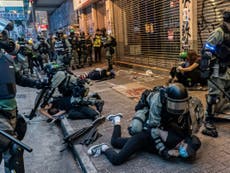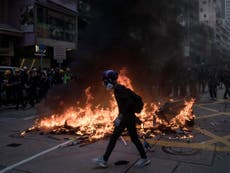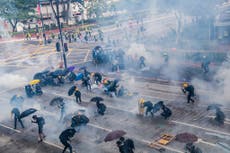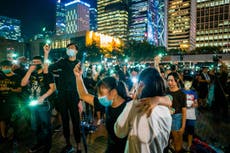Our research in Hong Kong reveals what people really think of the protesters – and the police
Petrol bombs and vandalism may not be popular in themselves, but public opinion is still firmly on the side of the democracy movement’s key demands
Even though the Hong Kong government has withdrawn the controversial extradition bill that roused the largest protest movement in the region’s history, the uprising it triggered has yet to die down. Far from it: throughout September and October, police-protester clashes have continued to escalate, with levels of violence intensifying on both sides.
In recent weeks, the protesters’ tactics have now extended to vandalising metro stations and shops owned by mainland Chinese capital. Some have also started to embrace a tactic they call “private resolution”: the idea that given the untrustworthiness of the police, protesters should defend themselves and use proportionate violence against counter-protesters who assaulted protesters. This has been condemned in some quarters as plain and simple vigilantism.
And yet, over the past three months, public opinion toward protesters’ use of violence has hardly changed.
Over the last few months, the Centre for Communication and Public Opinion Survey of the Chinese University of Hong Kong have conducted a series of representative surveys of public attitudes toward the current protests. In our survey conducted in early August, only 39.5 per cent of 842 respondents agreed that the protesters have used excessive force; in our September survey of 623 people, which was conducted right after chief executive Carrie Lam withdrew the extradition bill, that figure held steady at 39.4 per cent.
And in our survey of 751 respondents conducted between October 8 and 14 – a particularly violent moment – the figure rose only slightly to 41.4 per cent.
One clear explanation for this stability is that the public have consistently viewed the police as far more violent and abusive. As protesters have graduated from simply throwing bricks to using petrol bombs and vandalising targeted shops, police tactics have escalated in parallel, going beyond tear gas and rubber bullets to deploying specialised crowd management vehicles and firing live rounds. In one incident during the protests on China’s National Day, a police officer beset by several protesters fired at the chest of an 18-year-old protester at close range (fortunately the youngster survived).
Sure enough, the same series of surveys found that through the last three months, 68 per cent, 72 per cent, and 69 per cent of the respondents agreed that the police had used excessive force.
Besides decrying the police’s increasingly harsh tactics in the streets, protesters who’ve been arrested have accused the police of meting out physical and sexual abuse on people in custody. The police were also seen as violating a range of norms and rules supposedly regulating their conduct.
This in turn helps explain why the public so strongly support several of the movement’s core demands, among them universal suffrage, amnesty for arrested protesters, and the guarantee that the protests will not be classified as “riots”.
Another demand, the establishment of an independent commission of inquiry to look into police misconduct as well as the protest movement at large, was supported by 80 per cent, 80 per cent, and 88 per cent of the respondents in the August, September, and October surveys respectively.
After the demonstrations on China’s National Day, which were among the most violent since the protests took hold, some of the movement’s supporters adjusted their slogan from “five demands, not one less” to “six demands, not one less”, the additional demand being the dissolution of the entire police force. CUHK’s October survey asked the respondents whether the police force needs a major restructuring: close to 70 per cent replied affirmatively.
Meanwhile, as the Hong Kong government continues to reject the movement’s broadly popular demands and the police continued their hardline approach, the general public’s trust in both the government and the police force has continued to deteriorate to the lowest of levels.
In August, asked to indicate how much they trusted the government and police on a 0-to-10 scale, 44 per cent of the Hong Kong public gave the Hong Kong government a score of 0, while 43 per cent gave 0 for the police, putting the mean scores for the government and the police were 2.77 and 3.08 respectively. In the October survey, 49 per cent of the respondents gave the Hong Kong government a score of 0, and 52 per cent gave the police a score of 0 – taking their mean scores down to 2.32 and 2.60.
Meanwhile, 75 per cent, 74 per cent and 81 per cent of the respondents in the three surveys supported political reform in order to ensure that the whole of Hong Kong’s legislature and its chief executive be democratically elected.
Overall, then, the public are still remarkably amenable toward the protesters’ radical tactics. In the October survey, 59 per cent of respondents agreed that “when large-scale protests cannot force the government to respond, it is understandable that protesters would take radical actions”.
Of course, that someone finds certain actions “understandable” doesn’t mean they consider all actions acceptable. Sure enough, in the October survey, of those respondents who said they could “understand” the use of radical tactics, more than half could also name specific actions or tactics that they found unacceptable.
The bottom line is that while many Hong Kong citizens are ambivalent toward violent protests, and they find many of the protesters’ actions problematic, they also find it hard to blame the protesters for what’s become an alarming escalation of violence. In their eyes, the true culprits are the government and the police.






Join our commenting forum
Join thought-provoking conversations, follow other Independent readers and see their replies